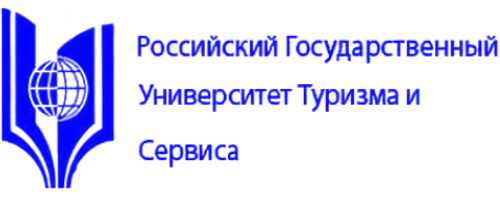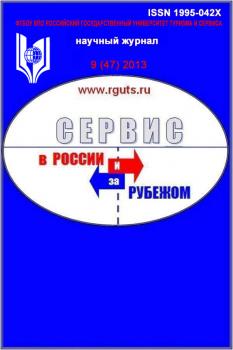Simferopol', Simferopol, Russian Federation
Along with machinery manufacturing, agriculture and port economy in the Republic of Crimea (RC) there is widely represented the sphere of services, which makes up more than 60 % of the Gross Regional Product and includes developed recreational activities. The Crimean Region (without Sevastopol) according to the number of the objects of placement occupies the second place, and according to the number of the placed tourists occupies the fifth place in the country. Last year Crimea was visited by more than 5,5mln tourists, exceeded the their number in 2015 for 21,6 %, what can be compared with the best indices of the Ukrainian period (2012 and 2013), though the potential of the touristic and recreational sphere (TRS), despite the losses of the recent decades, remains unused. The analysis of the economic state of Crimea has defined the existing problems of the region and under the conditions of realizing the Federal Targeted Program and Special Economic Zone shows that the existing system of the recreational economy and health resort services of Crimea are able to become the point of growth and driving force of the sustainable regional development. The unique opportunities of the progressive and qualitative development of the new subject of the Russian Federation based on the TRS priority made it possible to build the of sustainable development management system of the of the Republic of Crimea, and to work out its own model of the region development management. These models can be represented as the factors of restructurizing and creating administrative, economic and social connections and provide an opportunity to form the subsystem of management of the sustainable development of the Republic of Crimea based on the cluster integration of tourism and new relations of management. The article underlines that the creating cluster must be based on working out the concept of forming and functioning of the tourist and recreational cluster, which must be based on the wellgrounded infrastructure and technological network of creating the final product, and on the organizational community of the participants' interests and opportunities for maneuvering the available resources. Such approach increases the interest of municipalities, population, and region in the cluster integration, activates the mani-festation of the synergetic and cumulative effect, and also leads to forming the effect of multiplier in the region development.
region, sustainability, development, tourism and recreation sphere, management models, clusters
1. Vasilenko V.A., Vasilenko A.V. Klasterizaciya krymskih destinaciy v pravovom pole Rossii // Sovremennye problemy servisa i turizma. 2015. T.9. №1. S. 60-69. DOI:https://doi.org/10.12737/7920.
2. Bagrov N.V. Regional'naya geopolitika ustoychivogo razvitiya: Monografiya. K.: Lybid', 2002, 256 s.
3. Voronina A.B. Osobennosti organizacii territorial'noy rekreacionnoy sistemy na osobo ohranyaemyh prirodnyh territoriyah Respubliki Krym // Sovremennye problemy servisa i turizma. 2015. T.9. №1. S. 70-77. DOI:https://doi.org/10.12737/7921.
4. Yakovenko I.M. Rekreacionnoe prirodopol'zovanie: metodologiya i metodika issledova-niy: Monografiya. Simferopol': Tavriya, 2003, 335 s
5. Vetrova N.M. Ekologicheskaya bezopasnost' rekreacionnogo regiona: Monografiya. Simfe-ropol': RIO NAPKS, 2006. 297 s.
6. Dyshlovoy I.N. Sostoyanie, problemy i perspektivy razvitiya sanatorno-kurortnoy i tu-ristskoy otrasli Respubliki Krym // Sovremennye problemy servisa i turizma. 2015. T.9. №1. S. 51-59. DOI:https://doi.org/10.12737/7919.
7. Podsolonko V.A., Podsolonko E.A. Konceptual'nye osnovy klasternoy organizacii krymskogo rekreacionnogo makroregiona // Sovremennye problemy servisa i turizma. 2016. T.10. №1. S. 83-92. DOI:https://doi.org/10.12737/17787.
8. Aleksandrova A.Yu., Vladimirov Yu.L. Osobennosti sozdaniya turistskih klasterov v Ros-sii (na primere Vologodskoy oblasti) // Sovremennye problemy servisa i turizma. 2016. T.10. №1. S. 47-57. DOI:https://doi.org/10.12737/17783.
9. Vasilenko V.A. Nauchno-metodologicheskie osnovy formirovaniya sistemy upravleniya ustoychivym razvitiem regiona v knige: Nauchno-metodologicheskoe obespechenie upravle-nie ustoychivym razvitiem regiona: monografiya / Pod red. Yu.P. Maydanevich. Simfero-pol': DIAYPI, 2017. S. 130-181.
10. Pomorov S.B., Bozhenko S.A. Koncepciya razvitiya turistsko-rekreacionnogo klastera na territorii goroda Barnaula. Nauchno-issledovatel'skaya i proektnaya rabota. Barnaul: InArhDiz AltGTU, 2013. T.1. 156 s.
11. Kotler P. Marketing Place. NY: Free press, 1993. 367 p.
12. Porter M.E. Clusters and the New Economics of Competition // Harvard Business Review. Vol. 76 (6), 1998. Pp. 77-90.
13. Porter M. The Economic Performance of Regions // Regional Studies. 2003. Vol.37. Pp. 549-578.





